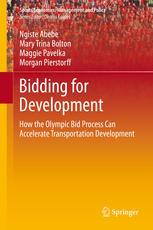

Most ebook files are in PDF format, so you can easily read them using various software such as Foxit Reader or directly on the Google Chrome browser.
Some ebook files are released by publishers in other formats such as .awz, .mobi, .epub, .fb2, etc. You may need to install specific software to read these formats on mobile/PC, such as Calibre.
Please read the tutorial at this link: https://ebookbell.com/faq
We offer FREE conversion to the popular formats you request; however, this may take some time. Therefore, right after payment, please email us, and we will try to provide the service as quickly as possible.
For some exceptional file formats or broken links (if any), please refrain from opening any disputes. Instead, email us first, and we will try to assist within a maximum of 6 hours.
EbookBell Team

0.0
0 reviewsIn 2012, over four billion people tuned in to watch the London Summer Olympics. As the single largest mega-event in the world, the Olympics has the power to captivate the global imagination. Long before athletes vie for a gold medal, however, competition between cities eager to host the Games kicks off with a rigorous bid process. The lengthy and expensive endeavor to host the Olympics is as high-stakes as any sporting event. Rather than encouraging cities to refrain from bidding, Bidding for Development takes a policy approach that challenges stakeholders to bid responsibly and strategically in pursuit of concrete outcomes.
Every bid city has the potential to accelerate long-term transportation development through a strategic and robust planning process. This book concentrates on the phenomenon of repeat Olympic bids and the opportunities that may come from bidding, particularly for those cities that never win the Games. In this context, Bidding for Development explores the intersection between transportation infrastructure development, the Olympic bid process, and the resulting legacies experienced by bid losers. The findings address the central question: how can participating in the Olympic bid process accelerate transportation development regardless of the bid result?
In response, this book presents a Bid Framework outlining how and when cities may use the bid to unite resources, align transportation priorities, and empower leaders to achieve urban development objectives in preparation for the Olympic bid. The Bid Framework is then applied to two case studies, Manchester and Istanbul, to examine each bid loser's effectiveness in using the bid process to catalyze transportation development. Concurrently, the book takes into consideration how the International Olympic Committee’s evolving bid regulations and requirements relate to urban development and positive social legacy. Bidding for Development delivers actionable recommendations for all Olympic stakeholders to improve the value of the bid process and transportation benefits beyond the Games.